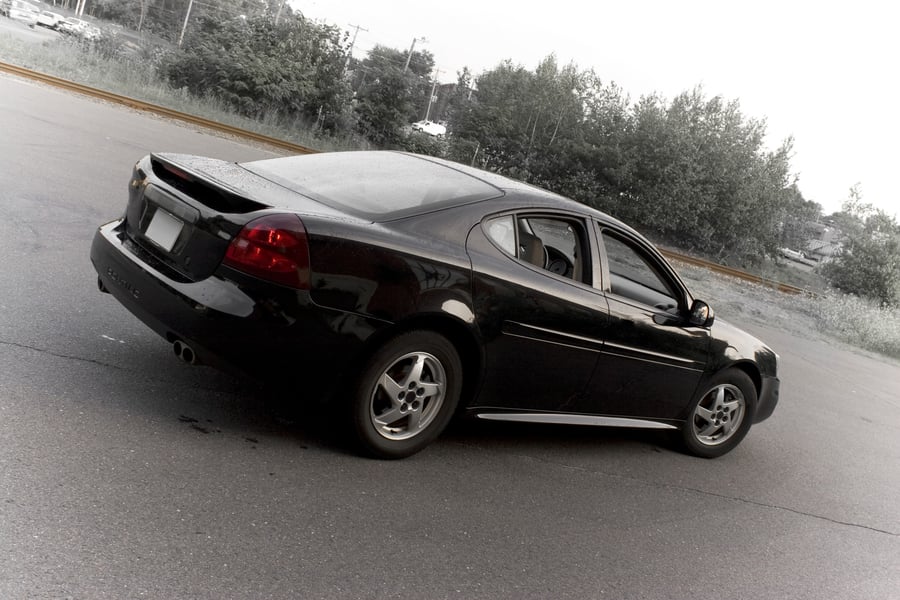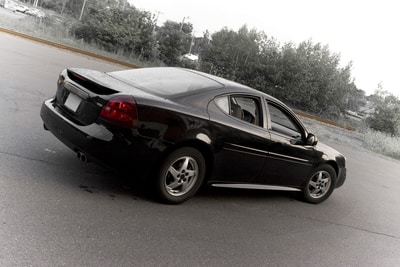
Boating is a hobby that can sometimes feel like a big leap to actually get started in… you need the right boat, somewhere to go, all of the gear, and oh shoot… do I really have to rethink what kind of car I need just to have a boat? What if I don’t drive a truck or SUV? Are my boating days over before they begin? For some of you out there, you’re asking the question:
Can I tow a Jon Boat with my car?
Many small cars and sedans have a towing capacity of 1,000-1,500 pounds meaning they can technically tow a Jon Boat (150-500 pounds on the smaller end) on a small trailer (200-400 pounds). However, most average cars are generally not designed for this type of activity so you should read your vehicle manual to understand its specific limitations and proceed with caution. The safest option is to use a truck or SUV.
In other words, our short answer leans towards the “yes” side of “maybe”, but we think you should proceed with appropriate caution. That being said, here’s an important disclaimer we must make.
Disclaimer
We do not recommend using your vehicle for something that is outside of the manufacturer’s published limitations and functions for that make and model. We have compiled advice based on industry research and the aggregation of other users’ experiences across the Internet. This advice may not be suitable for your specific situation and Jon Boat Planet is not responsible for any resulting impact to your boat, vehicle, or person based on your implementation of advice and information contained in this article.
Phew. That’s a fancy way of saying “look, we don’t recommend doing this.” But that would make for a pretty boring article if we stopped there. If you ended up on this page, you probably want to know how to go about towing a Jon Boat with your car. So let’s talk about it.
Here’s the Short Version
We’ve taken time to write a fairly thorough article on this topic below, and we feel that there is valuable information in there. But if you’re in a hurry, we wanted to give you the bullet points:
- Your car or sedan is most likely going to only be able to carry and pull around 1,000 – 1,500 pounds. Crossovers, hybrids, and SUVs will usually have more than that, but are not covered in this post. You’ll need to read your vehicle manual to understand the exact number for your car.
- Jon Boats are going to weigh somewhere between 200-500 pounds, plus a small trailer of another 200-400 pounds. We’ve written a whole article on average Jon Boat weights that might be a good reference for you. That combined weight will eat up most of the carrying capacity of your car/sedan since towing capacity includes everything else in your car like occupants, luggage, and fuel.
- Make sure your towing package is installed really well. Drive slow (under 60mph) and go easy on the brakes. You should minimize stress to the frame of the car and the pressure on your tow kit.
- Don’t flood your car trying to launch your boat on the ramp. Jon Boats don’t need much water clearance so make sure to not get your car stuck on the boat ramp trying to back in far enough to launch your boat.
- Fair warning, you might damage the engine, transmission, brakes, and or entire frame of the vehicle. Asking your car to do something it wasn’t designed for has inherent safety and mechanical risks. Proceed with caution, if you do at all.
- The best advice is to get a truck or SUV that is made for this. Bottom line.
Here’s the Longer Version
Towing Capacity
Towing capacity is basically a rating of how much your car can pull. It’s the basis upon which we’re going to answer the question of pulling a Jon Boat with a car. A common misunderstanding of towing capacity is that people think it’s simply the amount of weight the vehicle can tow behind it. That’s only partially true.
Towing capacity includes not only what the vehicle is towing, but also all of the carried weight inside of the vehicle like occupants, baggage, and fuel.
So, you’ll need to make sure that when looking at your towing capacity you are factoring in anything else you might be carrying inside of your car, not just what’s behind it.
What’s the towing capacity of trucks?
We know this article isn’t about trucks, but we want to provide this information as a reference point to put the data we’ll share on cars and sedans into perspective.
“Trucks” would be hard to sum up in one blanket statement, so here is the published towing capacity of a few trucks from small to large:
- 2018 Toyota Tacoma: 3,500 – 6,800 pounds
- 2018 Nissan Frontier: 3,500 – 6,500 pounds
- 2018 Chevy Colorado: 3,500 – 7,000 pounds
- 2018 Ford F-150: 5,000 – 8,000 pounds
- 2018 Chevy Silverado 1500: 5,500 – 9,400 pounds
- 2018 Ford F-250: 12,300 – 13,300 pounds
- 2018 Chevy Silverado 2500: 13,000 – 14,500 pounds
The point is, for daily use, trucks can carry a significant load. So when we’re talking about carrying say 1,000 pounds worth of boat, trailer, and gear, a truck is going to be able to handle this in its sleep.
What’s the towing capacity of cars?
Time for another disclaimer: it’s sometimes hard to even find a published “towing capacity” for cars that aren’t truly designed to tow anything. What we’ve listed below is just based on our own research, and this shouldn’t be used as a substitute for your own research and validation before you decide to attempt towing anything with your vehicle.
Choosing to add a tow package when the car wasn’t really designed for it has inherent safety and mechanical risks to it. That being said, here’s what we’ve been able to find based on a fair amount of research:
- Toyota Camry: 1,000 pounds
- Toyota Corolla: 1,500 pounds
- Toyota Avalon: 1,000 pounds
- Honda Accord: 1,000 pounds
- Honda Civic: 1,500 pounds
- Volkswagon Passat: 1,000 pounds
- Chevy Cruze: 1,000 pounds
- Hyundai Sonata: 1,250 pounds
- Mitsubishi Lancer: 1,000 pounds
- Subaru Impreza: 1,250 pounds
You’ll need to read your car’s manual, and most likely it will say: “Don’t tow stuff with this car. It’s a car.” Taking a look at the numbers, now you know why. That’s not a lot of load between people and things that you can load into a little car with a little engine.
We don’t want to be like this guy:
What determines towing capacity?
The biggest factor in towing capacity is your engine’s horsepower. Your car can only do as much work as the engine will, and little cars and sedans are not necessarily built beefy. Think about it – they’re built for comfort and gas mileage, not knock-your-socks-off torque and power.
Your car’s transmission and structural design will also play into its towing capacity a lot as well. Trucks are designed to be able to support the weight of something in the bed and or something behind the truck. A typical Camry is not built like this. Car manufacturers build axles differently for vehicles they design to tow things.
One more thing to keep in mind is that vehicles that are designed to tow things also have brakes designed to handle it. Your Nissan Maxima only needs to be able to stop itself on the highway, not necessarily a couple thousand pounds of weight on a trailer behind it as well. So if you decide to tow your Jon Boat with your car or sedan, know that the brakes weren’t necessary built for that. You need to drive carefully and more gently.
How much do Jon Boats weigh?
We’ve covered the estimated towing capacity of your small vehicle, and also talked about why that matters and what determines it. So if you know how much you can carry, then the next question is what does a Jon Boat weigh?
We put together a whole post trying to answer that question, and you can read it here. Since Jon Boats are generally produced to be between 10 and 18 feet in length, let’s look at the middle of that range. Based on our research, a 14-foot boat will weigh around 275-300 pounds between the hull and an engine. A 16-foot boat will be more like 500-525 pounds.
A trailer will be pretty variable in weight, but a simple aluminum trailer for your Jon will be around 300 pounds. It will obviously vary based on the size. Make sure to be sure of the exact weight of the trailer you purchase for your boat so that you can make informed decisions about towing it correctly.
All of that to say, count on 600-800 pounds at least for a 14-16 foot boat plus the trailer. For reference, Jet Skis are generally 850-1,000 pounds. A teardrop trailer (a tiny motor home) can be around 900 pounds, and we’ve read some articles on cars as small as a Camry being able to tow it. Jon Boats tend to be lighter because of their materials (i.e. aluminum) and simplicity.
How would you rig your car to tow?
Google is your friend here. We recommend simply searching your car make and model + “trailer hitch”. Curt Manufacturing has consistently good reviews we are finding and they make different versions for most popular cars and sedans.
You’ll want to make sure that the trailer’s Gross Trailer Weight Rating (GTWR) is large enough for the boat and trailer you plan to pull. This weight will also include any gear or fuel in the boat itself.
When looking into trailer hitches for your car you’ll also see a buzz word “Tongue Weight”. Tongue weight is just the amount of force (measured in pounds) that rests on the actual trailer hitch. Not all of the trailer weight will rest on the hitch alone, since the trailer has its own wheels that support most of its weight.
You’ll want to make sure that your trailer hitch’s tongue weight is at least 10-15% of the Gross Trailer Weight Rating. In other words, if you plan on pulling 800 pounds of Jon Boat and trailer, the tongue weight of your trailer hitch will need to be rated for at least 80-120 pounds. This shouldn’t be an issue. It’s when you start hauling some big loads that this calculation really starts to matter.
Lighting Requirements for Trailers
You’ll want to research your local and state laws for trailering a boat, but there are some general considerations in terms of brake and turn signal lighting when towing a boat:
- Brake lights are required to be on the trailer if the trailer blocks the view to your vehicle’s brake lights.
- Trailer license plate lights are required.
- Turn signals are not required unless the trailer is wider than 80 inches.
- Reflectors on each side of the trailer are required.
Again, check your local laws to make sure you are following the rules and don’t get pulled over because of your trailer.
Providing electricity for these trailer lights is something you need to consider. Trucks and many SUV’s already have a hookup for trailer lighting. For your car or sedan, check out this guide from Kurt Manufacturing (who we recommended earlier for the trailer hitches) on how to get an electrical hookup for your trailer in your car or sedan.
Warnings and Advice
We still don’t really recommend towing a Jon Boat with your car, although based on all of the above information, it is certainly possible. If you decide to press onward, here are some points of caution we want to mention that you should be aware of:
- Warning: You might really hurt the engine, transmission, and braking system of your vehicle.
- Advice: Drive slowly and very gently. Don’t rapidly accelerate, and don’t drive 90mph down the highway. Not only are you pushing your engine, you are also stressing the frame of the vehicle with the after-market towing package adding new points of pressure that the vehicle wasn’t really designed to have. Drive like you have a baby that’s asleep in the back seat and you don’t want them to wake up.
- Advice: Drive slowly and very gently. Don’t rapidly accelerate, and don’t drive 90mph down the highway. Not only are you pushing your engine, you are also stressing the frame of the vehicle with the after-market towing package adding new points of pressure that the vehicle wasn’t really designed to have. Drive like you have a baby that’s asleep in the back seat and you don’t want them to wake up.
- Warning: You might bottom-out the tongue of the trailer when going through a dip, potentially causing damage to your hitch assembly and vehicle itself.
- Advice: When pulling a trailer, you really have to be constantly mindful that there is something behind you. Be very, very gentle going over bumps, and try to avoid steep steep drop-offs where the tongue of the hitch could bottom out (like coming off of a steep driveway). The back fender of your car is going to be very close to the ground since you have added weight that wasn’t designed to be there. Go easy on it.
- Advice: When pulling a trailer, you really have to be constantly mindful that there is something behind you. Be very, very gentle going over bumps, and try to avoid steep steep drop-offs where the tongue of the hitch could bottom out (like coming off of a steep driveway). The back fender of your car is going to be very close to the ground since you have added weight that wasn’t designed to be there. Go easy on it.
- Warning: You might flood your car trying to launch your boat in the water.
- Advice #1: Remember that you don’t have much ground clearance with your car, especially when it’s weighed down with a trailered boat. As you back the trailer into the water to launch (or retrieve) your boat, don’t get deeper than about 1/3 to 1/2 the way up your tire in water. Honestly at that height you might even have water threatening to make it into the bottom of the doors, so don’t push it.
If that still isn’t far enough to launch your boat, personally I would just disconnect the trailer and hand-walk the trailer into the water and launch the boat. It’s not worth getting your car stuck and or flooded just trying to launch the boat. - Advice #2: If your muffler (exhaust pipe) is under water, do NOT turn off your engine. You don’t want water to be able to reverse path up into your engine and cause water damage. If you need to get out of your car, just put it in park with the parking brake on but leave the car running.
- Advice #1: Remember that you don’t have much ground clearance with your car, especially when it’s weighed down with a trailered boat. As you back the trailer into the water to launch (or retrieve) your boat, don’t get deeper than about 1/3 to 1/2 the way up your tire in water. Honestly at that height you might even have water threatening to make it into the bottom of the doors, so don’t push it.
Tow at your own risk, and good luck out there!


